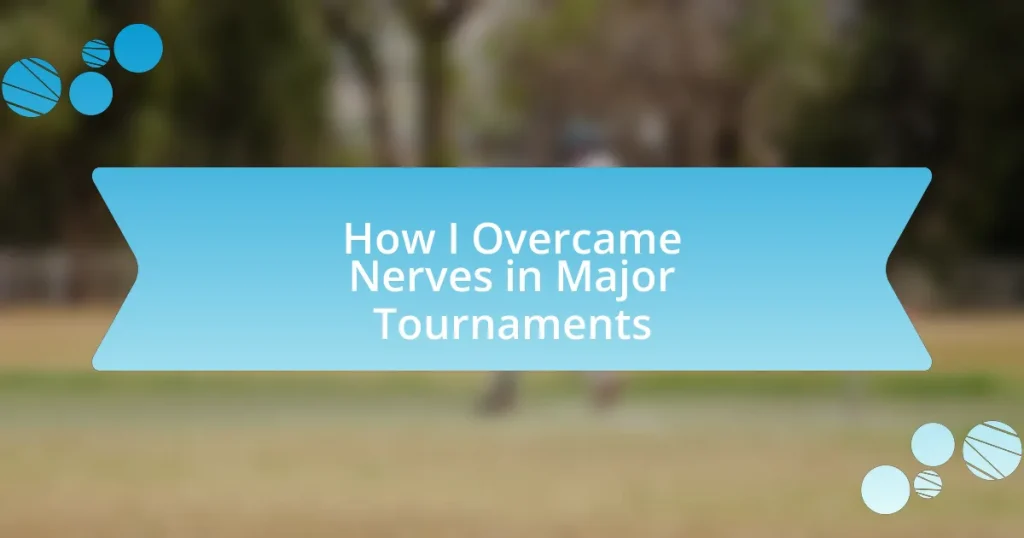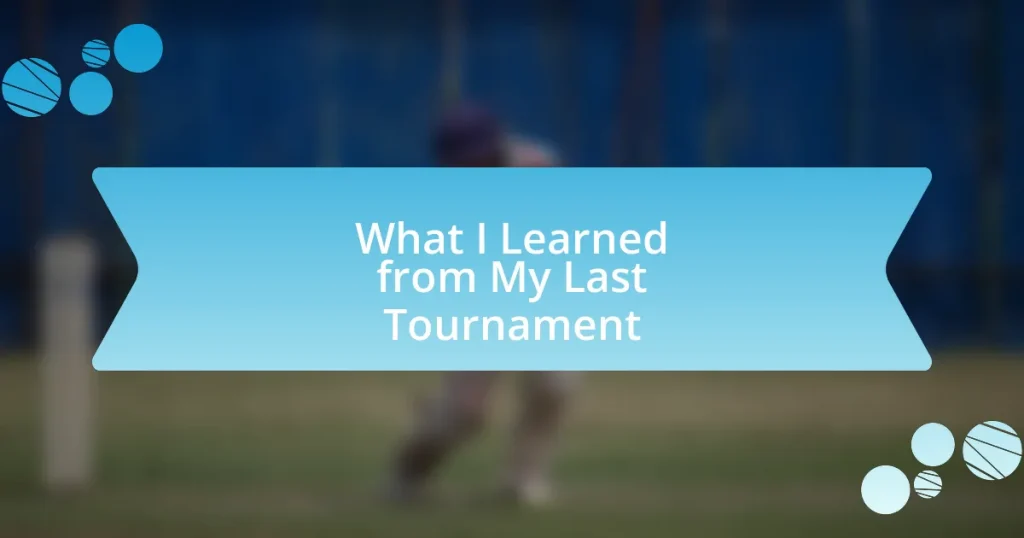Key takeaways:
- Performance anxiety is common among athletes, influenced by fear of judgment, comparison to others, and personal expectations.
- Developing mental resilience techniques, such as visualization, mindfulness, and a strong support system, can significantly alleviate anxiety.
- Implementing breathing exercises and establishing a pre-competition routine helps transform nervous energy into focused performance.
- Reflecting on past experiences, both successes and failures, provides valuable insights and contributes to personal growth and resilience.
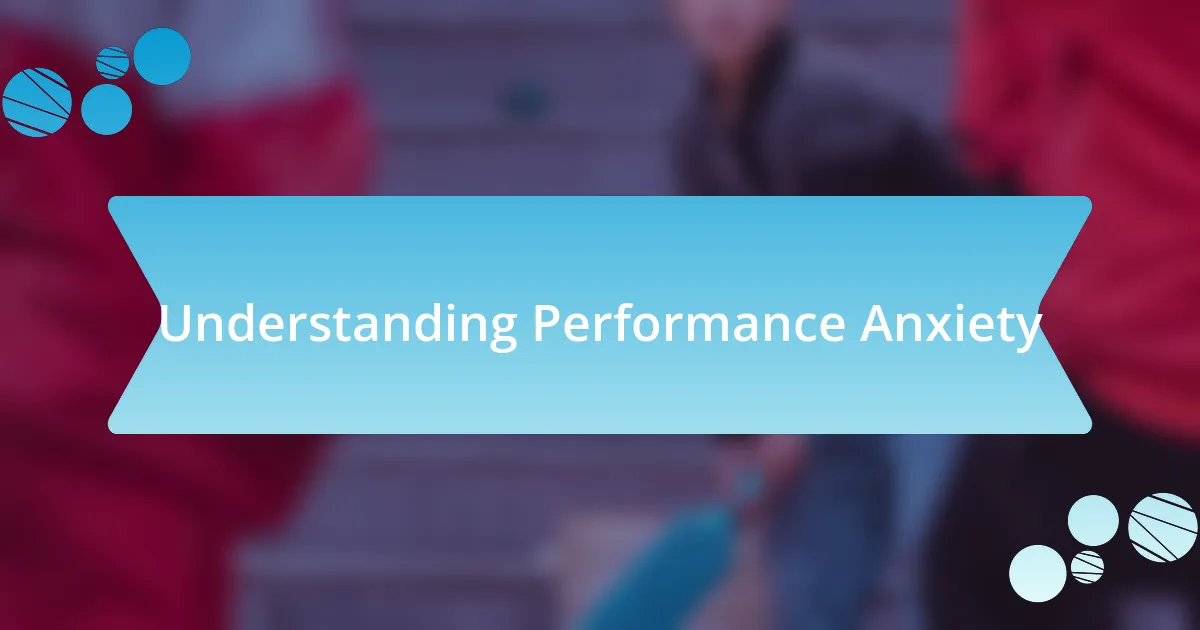
Understanding Performance Anxiety
Performance anxiety is something that many people face, especially in high-stakes situations like major tournaments. I vividly remember my heart racing and palms sweating before stepping onto the field, a feeling that seemed almost insurmountable. Could anyone truly understand the pressure that builds, making every moment feel amplified?
In those moments, I often questioned my abilities. It’s as if the inner critic starts to dominate my thoughts, whispering doubts like “What if I mess up?” or “What if I let everyone down?” This self-doubt creates a cycle of anxiety that can be paralyzing. Yet, I realized that these feelings are not unique to me; many athletes experience similar struggles.
As I began to explore these emotions, I discovered that performance anxiety often stems from the fear of judgment and failure. I found solace in recognizing that feeling nervous is a natural response—a sign that I care deeply about my performance. Isn’t it fascinating how we can learn to view these nerves not as a hindrance but as a signal to heighten our focus and energy?
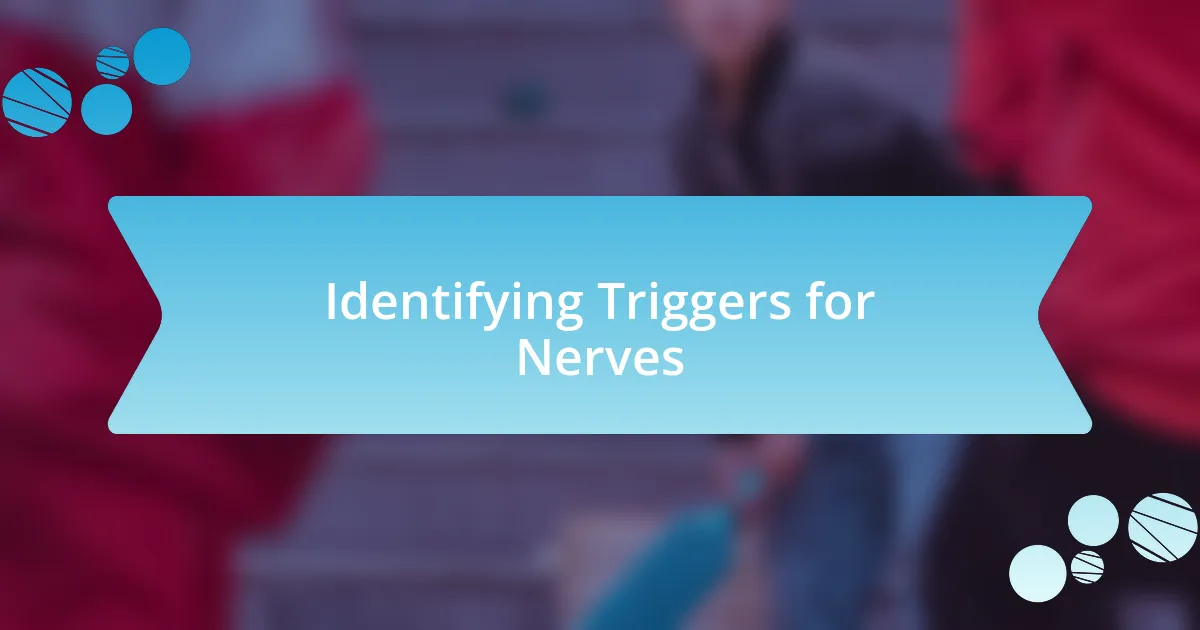
Identifying Triggers for Nerves
Identifying what triggers my nerves has been a game changer in managing performance anxiety. I remember standing backstage before a major tournament, feeling a tight knot in my stomach as I overheard the chatter of my competitors. It hit me then that the pressure I felt wasn’t just about the game itself but also the expectations I placed on myself and the environment surrounding me.
Here are some common triggers I identified through reflection:
- Fear of Judgment: Concerns about what others think can amplify nerves. I felt this whenever friends and family were in the audience, heightening my pressure to perform.
- Comparison to Others: Watching talented athletes around me can spark self-doubt. I often felt inferior when I focused on my opponents rather than on my own strengths.
- Personal Expectations: Setting high goals can backfire when I internalize the need to meet them. I learned that while striving for excellence is important, it shouldn’t come at the expense of my enjoyment and peace of mind.
- Environmental Factors: Sometimes, it’s the atmosphere of the venue—the intensity of the crowd or the sterility of the surroundings—that can trigger my nerves.
By pinpointing these common triggers, I’ve found that awareness is the first step in tackling my anxieties. The moment I recognize these feelings, I can better navigate the emotional landscape of competition.
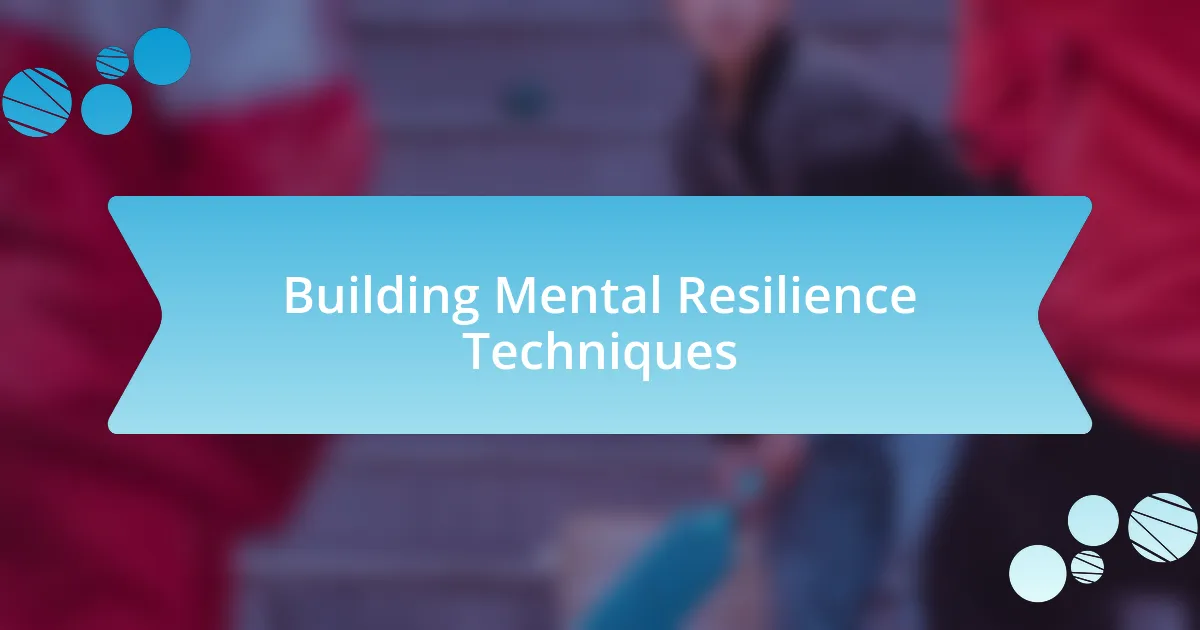
Building Mental Resilience Techniques
Building mental resilience is crucial for overcoming nerves in high-stress situations like major tournaments. One technique that has served me well is visualization. Before a competition, I take time to imagine myself successfully executing my skills, feeling the adrenaline but also the calm that follows. This practice not only helps me focus but also builds my confidence, as I mentally prepare for various scenarios that may arise.
Another valuable strategy is practicing mindfulness. I remember a tournament where I struggled with nerves as I waited for my turn. Instead of letting anxiety spiral, I focused on my breath, grounding myself in the present moment. This shift in focus transformed my experience; I became more aware of my emotions and learned to accept them without judgment. Mindfulness became a powerful tool, helping me maintain control even when pressure peaked.
Additionally, developing a strong support system can enhance mental resilience. I have found that connecting with teammates before competitions helps alleviate stress. Sharing our fears and strategies creates a sense of camaraderie and normalizes the challenges we face. Knowing that I’m not alone in my experiences makes the pressure feel lighter and more manageable, allowing me to channel my nervous energy into a more positive outcome.
| Technique | Description |
|---|---|
| Visualization | Imagining success to build confidence and prepare for competition scenarios. |
| Mindfulness | Focusing on the present moment, accepting emotions without judgment to alleviate anxiety. |
| Support System | Building connections with teammates to share fears and normalize challenges. |
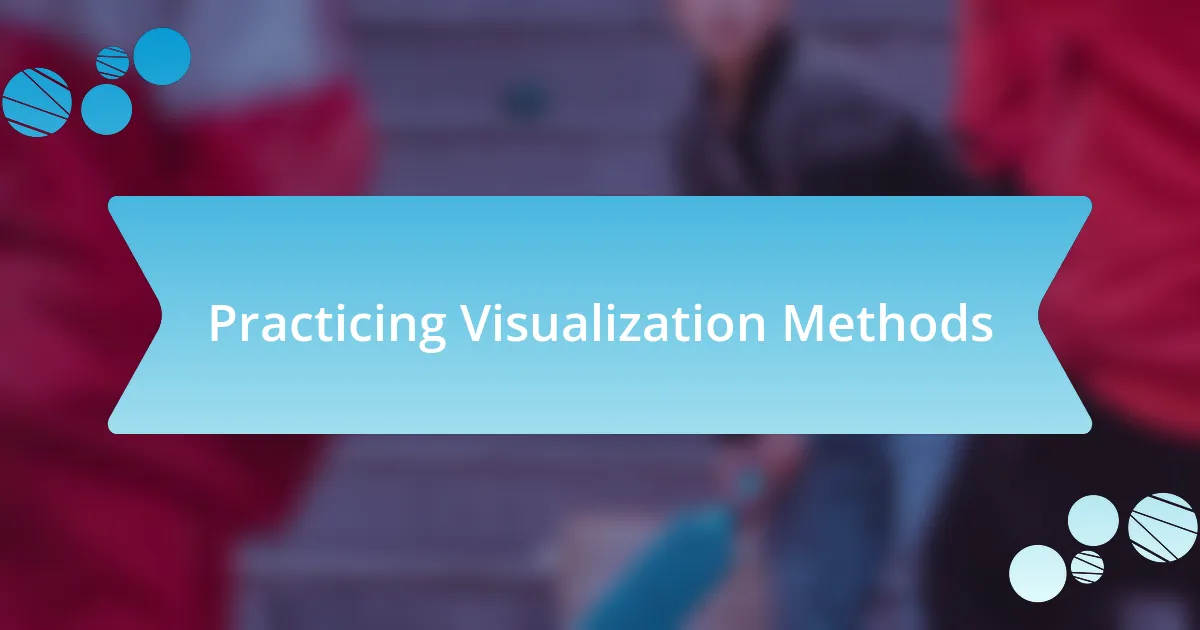
Practicing Visualization Methods
Practicing visualization methods has been a game-changer for me. I remember standing backstage, heart racing, and I paused to visualize every detail of my performance. I picture the arena, hear the cheers, and focus on executing each move flawlessly. This mental rehearsal not only calms my nerves but allows me to develop a roadmap of how to respond to any unexpected twists during the competition.
There have been moments when doubt creeps in, and I ask myself, “What if I mess up?” In those times, visualization helps turn that fear around. By imagining my success in vivid detail—the adrenaline flowing, the crowd cheering—I transition from anxiety to anticipation. Suddenly, I’m not just hoping to succeed; I’m confident in my abilities because I’ve already seen myself achieve it in my mind.
On tough days, I’ve even gone a step further by visualizing not only successful outcomes but also overcoming challenges. I can replay scenarios where things don’t go as planned, imagining my resilience in those moments. This practice becomes a mental safety net. Instead of fearing failure, I learn to embrace it as part of my journey, which, honestly, has made me more prepared and remarkably fearless in competition.
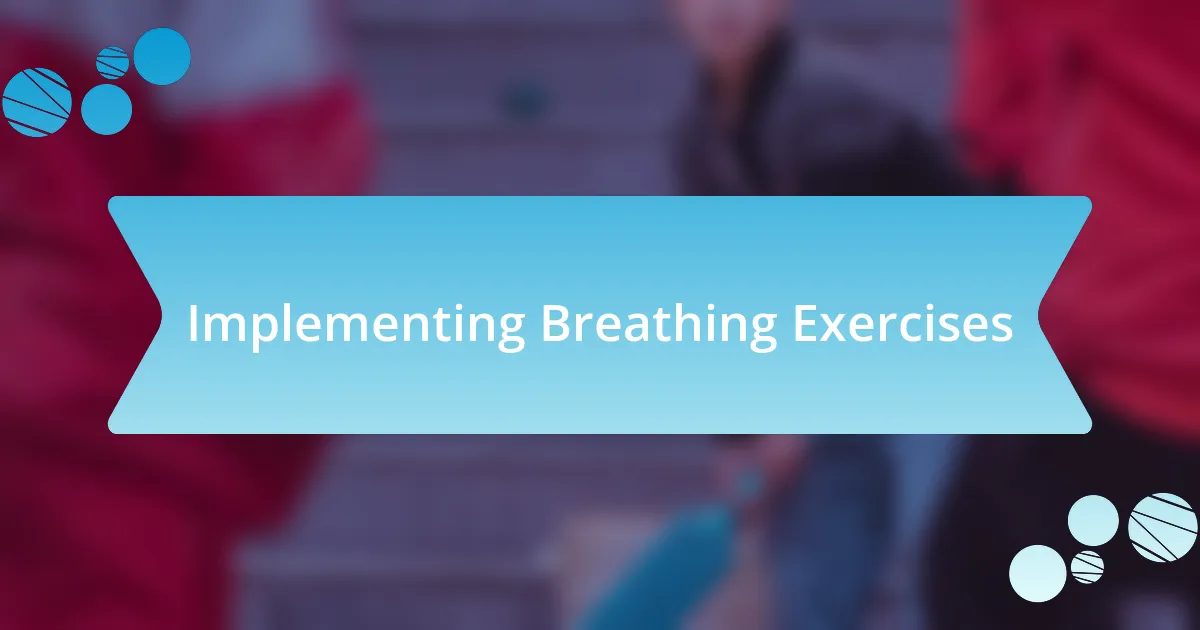
Implementing Breathing Exercises
Implementing breathing exercises has been a transformative experience for me during major tournaments. I remember one particular event where I felt the weight of expectations pressing down on me. Before heading on stage, I took a few moments to close my eyes and practice deep breathing, inhaling slowly through my nose and exhaling through my mouth. It was like flipping a switch; with each breath, the tightness in my chest eased, and I began to feel a wave of calm wash over me.
I often find that consciously focusing on my breath helps me reclaim control when anxiety strikes. Have you ever noticed how your breath quickens in moments of stress? By deliberately slowing my breathing, I broke that cycle of panic. I’ve incorporated a simple technique: four counts in, holding for four, and then exhaling for six. This not only steadies my heart rate but also clears my mind, allowing me to focus solely on my performance rather than the weight of the moment.
The beauty of these exercises is that they can be done anywhere. Whether I’m behind the curtain or just before stepping onto the field, finding a quiet space to reconnect with my breath makes all the difference. I can’t stress enough how powerful it feels to shift from a state of tension to one of grounded calm, and honestly, that small act of breathing has become my secret weapon in turning nerves into focused energy.
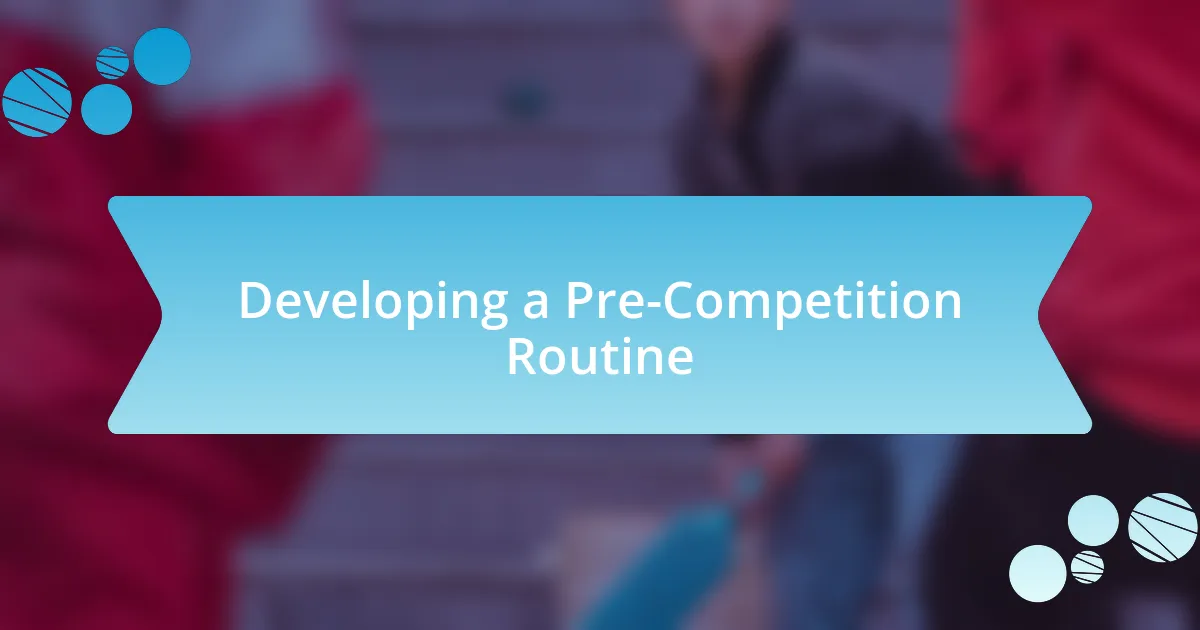
Developing a Pre-Competition Routine
Establishing a pre-competition routine was a game-changer for me. I remember my first major tournament; the excitement was overwhelming, and I struggled to focus. It hit me that creating a consistent series of steps could help manage my nerves. So, I began by organizing my gear the night before, laying everything out as if I were prepping for the biggest battle of my life. This simple act brought a sense of order amid the chaos.
I’ve found that incorporating light stretching into my routine not only warms me up physically but also serves as a mental cue to signal “game time.” It was during one particularly intense competition that I made stretching a deliberate part of my ritual. As I leaned into a stretch, I could feel the tension melt away, transforming that nervous energy into a focused mindset. Isn’t it incredible how small changes can have such a profound impact?
Listening to music has also woven its way into my routine, creating a shield of positivity around me. I remember curating a playlist with my favorite upbeat tracks, which instantly lifted my spirits. As I put my headphones on and lost myself in the rhythm, I felt charged, almost as if I was stepping into a different persona. Can you relate to that transformative moment when the right song makes you feel invincible? This ritual of music allows me to enter competitions not just prepared, but truly energized and ready to shine.

Reflecting on Past Experiences
Reflecting on my past experiences has been a powerful tool for managing nerves. I often think back to that nail-biting championship match where I felt the pressure mounting. It’s funny how recalling those moments, both the successes and failures, can serve as a reminder of how far I’ve come. I remember standing on the sidelines, my heart racing, yet somehow those memories grounded me and provided perspective.
One particular setback stands out vividly in my mind. I had entered a tournament brimming with confidence, only to falter in a moment I should have thrived. It was heartbreaking, but reflecting on that experience taught me valuable lessons about resilience and preparation. The emotions tied to those memories can be intense, yet they remind me that growth often comes from failure. How often have you found unexpectedly profound insights hidden within the struggles of your past?
Now, when I’ve faced overwhelming nerves, I draw strength from those earlier experiences. I visualize myself overcoming challenges, channeling the lessons learned from both triumphs and defeats. This mental rehearsal is akin to having a personal highlight reel playing in my mind; it reminds me that I’ve already faced tough situations and emerged stronger. Isn’t it comforting to realize that every challenge paved the way for personal growth?










